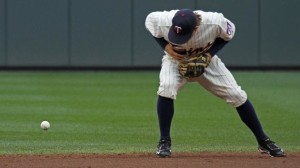 The little leagues in my area have between 100 and 300 kids participate every year. In just my city of Vancouver, WA there are 7 different leagues. So we are talking roughly 1400 kids in just the Vancouver city limits. If you expand that to our county (18 little leagues), you are talking approx. 3600 little leaguers. Who knows, that might even be low.
The little leagues in my area have between 100 and 300 kids participate every year. In just my city of Vancouver, WA there are 7 different leagues. So we are talking roughly 1400 kids in just the Vancouver city limits. If you expand that to our county (18 little leagues), you are talking approx. 3600 little leaguers. Who knows, that might even be low.
Age groups 5-12 is where the majority of these kids come from. This is a group where the youngest ones, especially the tee ballers, are playing because their parents either love the game themselves or are looking for something active for the little ones to do. I have three children and these are definitely factors in why our kids have played on baseball teams, basketball teams, soccer teams and taken gymnastics.
Now during that time, it becomes very apparent to the parents if their child enjoys it and has some skill or if it is just not the sport for them. So by the age of twelve, you will have seen those numbers dwindle compared to the numbers that were playing at the 5-9 age groups.
Little League recently added a new level which uses a mid sized field. So instead of jumping to 60’ from 46’ for pitchers, they can spend a couple years pitching from 50’. The base paths go to 70’ from 60’ instead of jumping right to 90’. In my opinion, the creation of this level was made by little league because there are other leagues/organizations out there that have been offering this for a while now. A big one that comes to mind is the Cal Ripkin Baseball league. I believe they started offering this in 2007. I don’t know when and who started this level and don’t know really anything about the rules of these leagues, but I do see the value in it. I remember it being tough making that jump from the little field to the big one. Something to keep in mind though, if you are trying to decide if your child should play at this level, every single player you see on TV right now went straight from the small field to the big field. There is a transition period but, honestly, it’s not a big deal. Let the child be humbled a little bit, it’s good for them.
Sorry, got a little off track there. So after kids graduate from the small field, you really see these numbers drop. So much to the point where some leagues struggle to even put together a 13U or 14U team. These days there is so much out there to choose from when a player turns 13. You’ve got LL, Babe Ruth and so many different organizations and independent teams to choose from. If you walk away from LL and go the org. or independent route, take the time and do your due diligence. There are some good ones out there and there are also some not so good ones. Ask around, especially about the coaches.
Once High School starts, only the best youth players survive. In our area, many of the schools don’t have Freshman/C teams any longer because of funding cuts. Now you are looking at only 30-40 kids making the teams at the schools that have only 2 teams to make. We have 7 high schools in Vancouver so you are talking maybe 400 (some of them do still have a freshman team) of the 1400 kids in Vancouver who played little league will end up playing baseball in high school.
High school to college. You might see anywhere from 1-5 kids from each HS varsity team go on to play some level of college ball. Again, you see the numbers dramatically drop here.
College to Professional Ball. You might see a handful of players that are seen as good enough to possibly contribute at the Major League level someday. The draft is a huge gamble for ML organizations. It’s almost like playing the lottery. You can have a team spend millions of dollars on all their draft picks one year and they might not ever see any of those kids make the big leagues.
Minor league ball to the big leagues. I would say you will see maybe 10% of players drafted will make the Major Leagues. Every SingleA team has 25 players so that means only 2-3 of those players will make it to the big leagues. The competition at that level is unreal.
Take a pitcher, in HS or College ball, the best one MIGHT get drafted. Once he does, he will find himself on a team with other pitchers as good as him or maybe even better. Sometimes this is hard for guys to handle. Their ego can get in the way and next thing you know they are gone. It’s unfortunate but that’s the reality of pro ball. Like I said, the competition is like no other.
After doing some research, I found there is approx. 3 million little leaguers in the US, so that means only .003% of little leaguers will even get to play in the major leagues! I knew it was low but didn’t realize it was that low.
There are many more tangibles to the game once a player goes pro but that is for another day. This is “The weeding out process”.
 Chris Gissell (174 Posts)
Chris Gissell (174 Posts)Founder of Baseball Dudes. Blessed with three beautiful children and an amazing wife. Baseball is my life, after my family, and I love sharing what I have learned from it. Thanks for taking the time to view what we offer here at Baseball Dudes.
 Sports are an amazing thing. They give us plenty of joy, always a good workout and for those that sports are a part of their life, they teach us life lessons. In my opinion baseball is the toughest sport both physically and mentally.
Sports are an amazing thing. They give us plenty of joy, always a good workout and for those that sports are a part of their life, they teach us life lessons. In my opinion baseball is the toughest sport both physically and mentally. 




 One of the best experiences in my baseball career so far. Japan is a beautiful country and we would love to visit it again someday.
One of the best experiences in my baseball career so far. Japan is a beautiful country and we would love to visit it again someday.  Major League Baseball, it doesn’t get any better. It’s the absolute highest level any one player can play at. It’s where you have to be to become a hall of famer. In our generation, it’s where you have to be if you want to make truck loads of money playing the game of baseball.
Major League Baseball, it doesn’t get any better. It’s the absolute highest level any one player can play at. It’s where you have to be to become a hall of famer. In our generation, it’s where you have to be if you want to make truck loads of money playing the game of baseball.  As a parent, I want the best for my children. My youngest is a girl who recently started Ballet. We are very happy to have found someone who has the credentials to make us comfortable that our little girl will get the best ballet instruction she can.
As a parent, I want the best for my children. My youngest is a girl who recently started Ballet. We are very happy to have found someone who has the credentials to make us comfortable that our little girl will get the best ballet instruction she can.  What does this mean? It’s the player who is the best at what they do and they know it. But the difference is you can’t tell when talking to or watching how this player carries themselves that they are the best. When they hit a home run, they simply put the bat down and run the bases (think Lance Berkman). When they make a great play in the field, they don’t have a huge grin on their face, they simply hold their hand up to let everyone know how many outs there is (think Derek Jeter). When they strike someone out, they get the ball back with a straight face, step on the rubber and wait for the next batter to step in the box (think Justin Verlander).
What does this mean? It’s the player who is the best at what they do and they know it. But the difference is you can’t tell when talking to or watching how this player carries themselves that they are the best. When they hit a home run, they simply put the bat down and run the bases (think Lance Berkman). When they make a great play in the field, they don’t have a huge grin on their face, they simply hold their hand up to let everyone know how many outs there is (think Derek Jeter). When they strike someone out, they get the ball back with a straight face, step on the rubber and wait for the next batter to step in the box (think Justin Verlander).  The little leagues in my area have between 100 and 300 kids participate every year. In just my city of Vancouver, WA there are 7 different leagues. So we are talking roughly 1400 kids in just the Vancouver city limits. If you expand that to our county (18 little leagues), you are talking approx. 3600 little leaguers. Who knows, that might even be low.
The little leagues in my area have between 100 and 300 kids participate every year. In just my city of Vancouver, WA there are 7 different leagues. So we are talking roughly 1400 kids in just the Vancouver city limits. If you expand that to our county (18 little leagues), you are talking approx. 3600 little leaguers. Who knows, that might even be low. 
 Every little league has them. The All-Stars. Some tall and over powering, some short with good hand eye coordination and some who are flat out just great. Most of these kids play other sports too. This helps them stay strong and grow up learning how to control their bodies.
Every little league has them. The All-Stars. Some tall and over powering, some short with good hand eye coordination and some who are flat out just great. Most of these kids play other sports too. This helps them stay strong and grow up learning how to control their bodies. 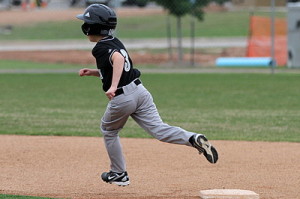
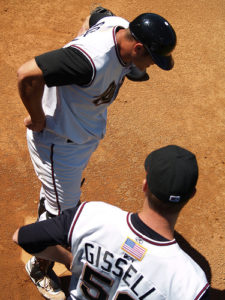 This is way more important than most players, parents and amateur coaches realize. Without good communication between the pitcher and catcher, it can be hard to get in a rhythm. When the pitcher has to consistently shake off the catcher’s signs, it is almost impossible to get in a groove. A pitcher and catcher should meet up before every game and talk about what that pitcher likes to throw in different counts and situations. What is his go-to pitch when he needs to throw a strike? How does the pitcher like the catcher to set up on different pitches? What are his favorite put away pitches? Make things easier on everyone and take a few minutes to see what your pitcher’s plan is.
This is way more important than most players, parents and amateur coaches realize. Without good communication between the pitcher and catcher, it can be hard to get in a rhythm. When the pitcher has to consistently shake off the catcher’s signs, it is almost impossible to get in a groove. A pitcher and catcher should meet up before every game and talk about what that pitcher likes to throw in different counts and situations. What is his go-to pitch when he needs to throw a strike? How does the pitcher like the catcher to set up on different pitches? What are his favorite put away pitches? Make things easier on everyone and take a few minutes to see what your pitcher’s plan is.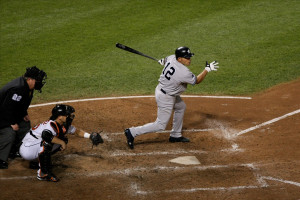 Every big league hitter starts their day in the cage by hitting the ball the other way. One, this helps us stay back on the ball and keep our weight where we need it to be. Two, this is a skill that every good hitter needs to have. At some point, you will get up to bat and it will be your job to move the runner over by hitting the ball the other way. When you are on the tee, set it up deeper in your stance and work on staying inside the ball and driving it the other way. When doing soft toss, or front toss, have your thrower toss them away so you can get comfortable with this. Finally, the beginning of your first round of batting practice should be focused on hitting it the other way. Like I said earlier, every good hitter can do this on command, can you?
Every big league hitter starts their day in the cage by hitting the ball the other way. One, this helps us stay back on the ball and keep our weight where we need it to be. Two, this is a skill that every good hitter needs to have. At some point, you will get up to bat and it will be your job to move the runner over by hitting the ball the other way. When you are on the tee, set it up deeper in your stance and work on staying inside the ball and driving it the other way. When doing soft toss, or front toss, have your thrower toss them away so you can get comfortable with this. Finally, the beginning of your first round of batting practice should be focused on hitting it the other way. Like I said earlier, every good hitter can do this on command, can you?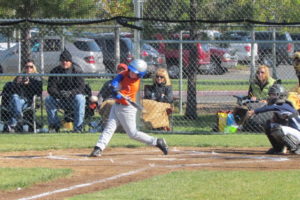 Once we step in the box, we are ready to hit. Look fastball and adjust to the off speed pitches. If we step in the box and are committed to an off speed pitch, the chances of us catching up to the fastball are very slim. Many times a hitters mind will get going way too fast, with too many thoughts and guesses, and step in the box not focused on what they need to be focused on. This will never equal a good result. Have a plan before you even get to the plate for the first pitch. You will more than likely need to make adjustments during the at bat, but never step in the box until your mind is calm and ready!
Once we step in the box, we are ready to hit. Look fastball and adjust to the off speed pitches. If we step in the box and are committed to an off speed pitch, the chances of us catching up to the fastball are very slim. Many times a hitters mind will get going way too fast, with too many thoughts and guesses, and step in the box not focused on what they need to be focused on. This will never equal a good result. Have a plan before you even get to the plate for the first pitch. You will more than likely need to make adjustments during the at bat, but never step in the box until your mind is calm and ready!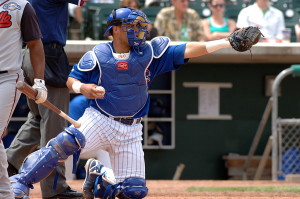 You can see the whole field from your position. Make sure everyone knows how many outs there are at all times. Step out in front of the plate, raise your voice, and let everyone know. Don’t be afraid to take a free out, and set up picks with your fielders. Make sure your fielders know where to throw the ball in different situations. Besides the pitcher, you can control the thought process of your entire team. If you want to be a big league catcher, get comfortable being vocal!!!
You can see the whole field from your position. Make sure everyone knows how many outs there are at all times. Step out in front of the plate, raise your voice, and let everyone know. Don’t be afraid to take a free out, and set up picks with your fielders. Make sure your fielders know where to throw the ball in different situations. Besides the pitcher, you can control the thought process of your entire team. If you want to be a big league catcher, get comfortable being vocal!!!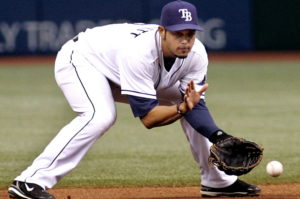 Just as a pitcher or hitter, a fielder needs to have a plan before every pitch. They need to know the situation: how many outs, where are the runners, what is the score, where does this guy tend to hit the ball, what is my pitcher throwing on this pitch? All of these will determine what I will do if and when the ball is hit to me. A fielder without a plan can get caught with the ball in their hand and no sense where to throw the ball. At the amateur level, this happens all too often. Parents and coaches, take the time to explain this to your players. Watch a game in person or on TV and have fun with it. Have your Dude put themselves in that situation and ask them what would they do if the ball was hit to them. A good fielder is always thinking and has a plan for when the ball is hit to them.
Just as a pitcher or hitter, a fielder needs to have a plan before every pitch. They need to know the situation: how many outs, where are the runners, what is the score, where does this guy tend to hit the ball, what is my pitcher throwing on this pitch? All of these will determine what I will do if and when the ball is hit to me. A fielder without a plan can get caught with the ball in their hand and no sense where to throw the ball. At the amateur level, this happens all too often. Parents and coaches, take the time to explain this to your players. Watch a game in person or on TV and have fun with it. Have your Dude put themselves in that situation and ask them what would they do if the ball was hit to them. A good fielder is always thinking and has a plan for when the ball is hit to them. Pitchers need to take responsibility for the running game. Too often we will see bases stolen and blame it on the catcher. This mind set must be switched. It is our responsibility to give our catcher a chance to throw that guy out. If we are too slow to the plate, it is OUR fault he was allowed to steal the base. If we do not vary our hold times, hold the ball for different periods of time from pitch to pitch, it is OUR fault he was allowed to steal the base. We as pitchers need to all understand that it is our job, and nobody else’s, to keep that runner at the base they are on.
Pitchers need to take responsibility for the running game. Too often we will see bases stolen and blame it on the catcher. This mind set must be switched. It is our responsibility to give our catcher a chance to throw that guy out. If we are too slow to the plate, it is OUR fault he was allowed to steal the base. If we do not vary our hold times, hold the ball for different periods of time from pitch to pitch, it is OUR fault he was allowed to steal the base. We as pitchers need to all understand that it is our job, and nobody else’s, to keep that runner at the base they are on.